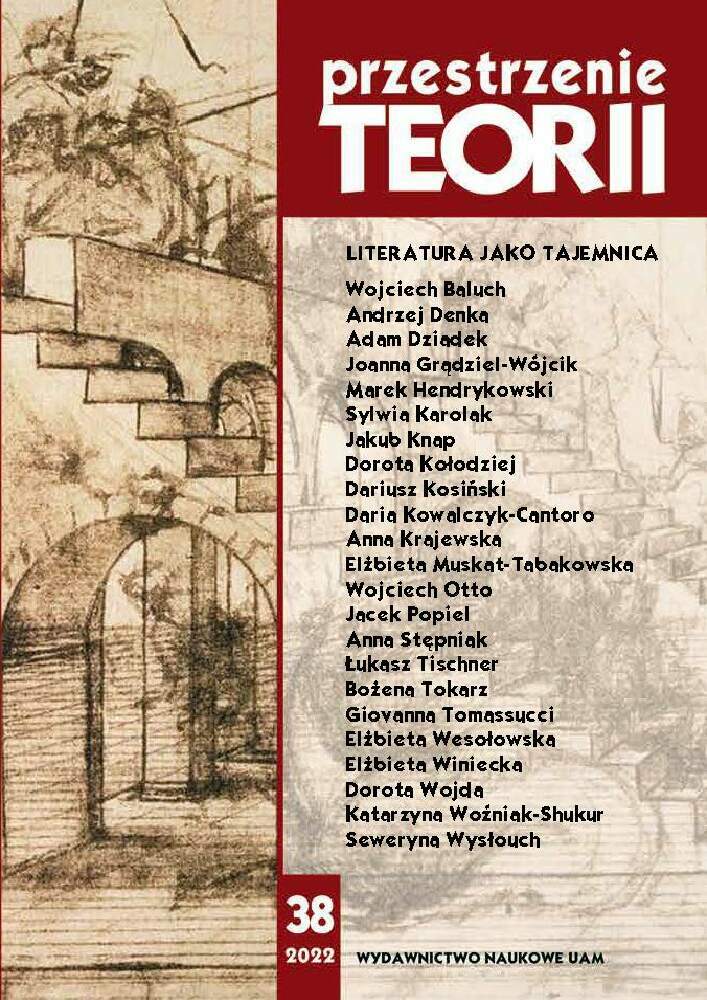Abstract
The article refers to Chernobyl prayer, the documentary prose of Svietlana Alexievich. The aim of the article is to draw attention to the presence of the genres of confession and prayer in the reportage. They are used by the interlocutors, who entrusted the journalist with their accounts of the traumatic experiences in connection with the Chernobyl nuclear disaster in 1986. The author focuses on showing various features of both genres (intimacy, familiarity, discretion) and describes them with the perspective of an average person who unknowingly and instinctively searches in them for answers that medicine and science cannot give. Alexievich’s reportage describes the loneliness of an individual in the face of events that most ignore in silence, while their participants remain helpless and mutilated for life.
References
Aleksijewicz S., Czarnobylska modlitwa. Kronika przyszłości, przeł. J. Czech, Wołowiec 2016.
Aleksijewicz S., Wojna nie ma w sobie nic z kobiety, przeł. J. Czech, Wołowiec 2010.
Cisło W., Różański J., Modlitwa w religiach świata, Pelplin 2015, s. 7.
Draguła A., W poszukiwaniu cech gatunkowych homilii i kazania. Uwagi teologa, [w:] Kazanie a literatura dawniej i dzisiaj, Warszawa 2017.
Fiktus P., Religia i kościół a komunizm w myśli politycznej Mikołaja Bierdiajewa, „Studia Erasmiana Vratislaviensia” 2011, z. V, s. 157–174, http://www.bibliotekacyfrowa.pl/Content/39041/008.pdf (dostęp: 10.02.2022).
Halek H., Uroki tajemnicy. O sekretach, które mogą ratować i niszczyć życie, „Zwierciadło”, https://zwierciadlo.pl/psychologia/9688,1,uroki-tajemnicy-o-sekretach-ktore-moga--ratowac-i-niszczyc-zycie.read (dostęp: 3.03.2022).
Harmonia, [w:] Encyklopedia muzyki, red. A. Chodkowski, Warszawa 1995, s. 342–343.
Kazanie, Homilia, [w:] Słownik terminów literackich, red. M. Głowiński, T. Kostkiewiczowa, A. Okopień-Sławińska, J. Sławiński, Wrocław 1998.
Lewandowska I., „Oral history” we współczesnej Polsce: badania, projekty, stowarzyszenia, „Wrocławski Rocznik Historii Mówionej” 2011, nr 1, s. 81–103, http://bazhum.muzhp.pl/media//files/Wroclawski_Rocznik_Historii_Mowionej/Wroclawski_Rocznik_Historii_Mowionej-r2011t1/Wroclawski_Rocznik_Historii_Mowionej-r2011-t1-s81-103/Wroclawski_Rocznik_Historii_Mowionej-r2011-t1-s81-103.pdf (dostęp: 12.02.2022).
Modlitwa, [w:] Religia, [w:] Encyklopedia PWN, red. T. Gadacz, B. Milerski, t. 7, Warszawa 2001–2003, s. 109–111.
Modlitwa, [w:] Słownik rodzajów i gatunków literackich, red. G. Gazda, Warszawa 2012, s. 576.
Prus K., O współczesnej rosyjskiej modlitwie poetyckiej. Od Mariny Cwietajewej do najnowszej modlitwy internetowej, Rzeszów 2014, s. 7.
Spowiednik, Spowiedź, Modlitwa, Tajemnica, [w:] Encyklopedia katolicka, red. F. Gryglewicz, R. Łukaszyk, Z. Sułowski, Lublin 2013, s. 715, 718, 1503–1506, 450–451.
Tabaszewska J., Dotkliwe historie, „Teksty Drugie” 2016, t. Wojna wstydów, nr 4, s. 302–323.
Tyszka K., Religijne oblicze komunizmu, [w:] Studia nas faszyzmem i zbrodniami hitlerowskimi XXXI, „Acta Universitatis Wratislaviensis” 2009, 3154, s. 327–344.
Waligórska-Olejniczak B., O mitach i obrazach kobiecości w prozie Swietłany Aleksijewicz, „Porównania” 2017, 20, 1, s. 97–105.
License

This work is licensed under a Creative Commons Attribution-NonCommercial-NoDerivatives 4.0 International License.
Authors
Authors of texts accepted for publication in Przestrzenie Teorii are required to complete, sign and return to the editor's office the Agreement for granting a royalty-free license to works with a commitment to grant a CC sub-license.
Under the agreement, the authors of texts published in Przestrzenie Teorii grant the Adam Mickiewicz University in Poznań a non-exclusive, royalty-free license and authorize the use of Attribution-NonCommercial-NoDerivatives 4.0 International (CC BY-NC-ND 4.0) Creative Commons sub-license.
The authors retain the right to continue the free disposal of the work.
Users
Interested Internet users are entitled to use works published in Przestrzenie Teorii since 2015, for non-commercial purposes only, under the following conditions:
- attribution - obligation to provide, together with the distributed work, information about the authorship, title, source (link to the original work, DOI) and the license itself.
- no derivatives - the work must be preserved in its original form, without the author's consent it is not possible to distribute the modified work, such as translations, publications, etc.
Copyrights are reserved for all texts published before 2015.
Miscellaneous
Adam Mickiewicz University in Poznań retains the right to magazines as a whole (layout, graphic form, title, cover design, logo etc.).

